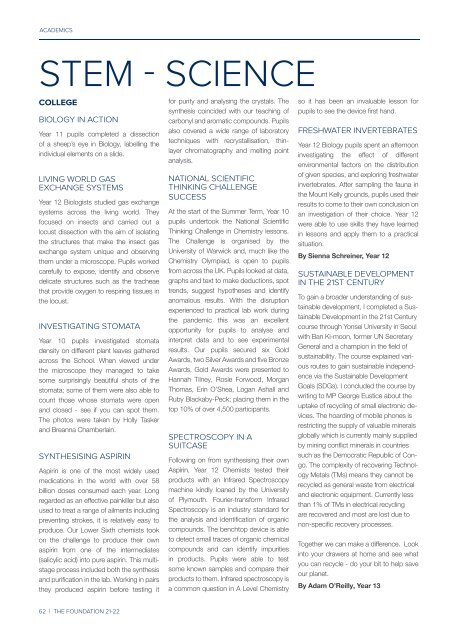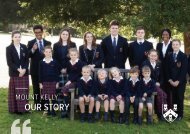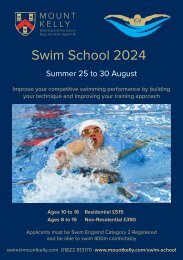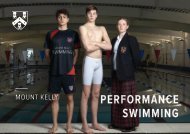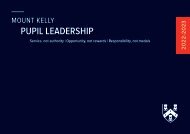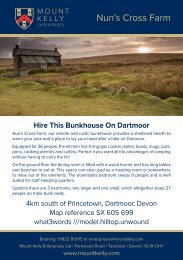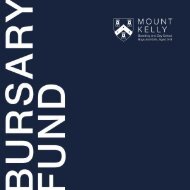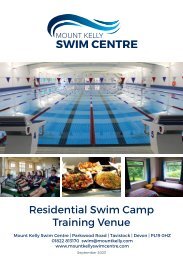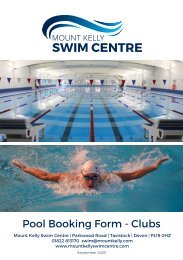Foundation Magazine 2021-2022 | Mount Kelly
You also want an ePaper? Increase the reach of your titles
YUMPU automatically turns print PDFs into web optimized ePapers that Google loves.
ACADEMICS<br />
STEM - SCIENCE<br />
ACADEMICS<br />
COLLEGE<br />
BIOLOGY IN ACTION<br />
Year 11 pupils completed a dissection<br />
of a sheep’s eye in Biology, labelling the<br />
individual elements on a slide.<br />
LIVING WORLD GAS<br />
EXCHANGE SYSTEMS<br />
Year 12 Biologists studied gas exchange<br />
systems across the living world. They<br />
focused on insects and carried out a<br />
locust dissection with the aim of isolating<br />
the structures that make the insect gas<br />
exchange system unique and observing<br />
them under a microscope. Pupils worked<br />
carefully to expose, identify and observe<br />
delicate structures such as the tracheae<br />
that provide oxygen to respiring tissues in<br />
the locust.<br />
INVESTIGATING STOMATA<br />
Year 10 pupils investigated stomata<br />
density on different plant leaves gathered<br />
across the School. When viewed under<br />
the microscope they managed to take<br />
some surprisingly beautiful shots of the<br />
stomata; some of them were also able to<br />
count those whose stomata were open<br />
and closed - see if you can spot them.<br />
The photos were taken by Holly Tasker<br />
and Breanna Chamberlain.<br />
SYNTHESISING ASPIRIN<br />
Aspirin is one of the most widely used<br />
medications in the world with over 58<br />
billion doses consumed each year. Long<br />
regarded as an effective painkiller but also<br />
used to treat a range of ailments including<br />
preventing strokes, it is relatively easy to<br />
produce. Our Lower Sixth chemists took<br />
on the challenge to produce their own<br />
aspirin from one of the intermediates<br />
(salicylic acid) into pure aspirin. This multistage<br />
process included both the synthesis<br />
and purification in the lab. Working in pairs<br />
they produced aspirin before testing it<br />
for purity and analysing the crystals. The<br />
synthesis coincided with our teaching of<br />
carbonyl and aromatic compounds. Pupils<br />
also covered a wide range of laboratory<br />
techniques with recrystallisation, thinlayer<br />
chromatography and melting point<br />
analysis.<br />
NATIONAL SCIENTIFIC<br />
THINKING CHALLENGE<br />
SUCCESS<br />
At the start of the Summer Term, Year 10<br />
pupils undertook the National Scientific<br />
Thinking Challenge in Chemistry lessons.<br />
The Challenge is organised by the<br />
University of Warwick and, much like the<br />
Chemistry Olympiad, is open to pupils<br />
from across the UK. Pupils looked at data,<br />
graphs and text to make deductions, spot<br />
trends, suggest hypotheses and identify<br />
anomalous results. With the disruption<br />
experienced to practical lab work during<br />
the pandemic this was an excellent<br />
opportunity for pupils to analyse and<br />
interpret data and to see experimental<br />
results. Our pupils secured six Gold<br />
Awards, two Silver Awards and five Bronze<br />
Awards. Gold Awards were presented to<br />
Hannah Tilney, Rosie Forwood, Morgan<br />
Thomas, Erin O’Shea, Logan Ashall and<br />
Ruby Blackaby-Peck; placing them in the<br />
top 10% of over 4,500 participants.<br />
SPECTROSCOPY IN A<br />
SUITCASE<br />
Following on from synthesising their own<br />
Aspirin, Year 12 Chemists tested their<br />
products with an Infrared Spectroscopy<br />
machine kindly loaned by the University<br />
of Plymouth. Fourier-transform Infrared<br />
Spectroscopy is an industry standard for<br />
the analysis and identification of organic<br />
compounds. The benchtop device is able<br />
to detect small traces of organic chemical<br />
compounds and can identify impurities<br />
in products. Pupils were able to test<br />
some known samples and compare their<br />
products to them. Infrared spectroscopy is<br />
a common question in A Level Chemistry<br />
so it has been an invaluable lesson for<br />
pupils to see the device first hand.<br />
FRESHWATER INVERTEBRATES<br />
Year 12 Biology pupils spent an afternoon<br />
investigating the effect of different<br />
environmental factors on the distribution<br />
of given species, and exploring freshwater<br />
invertebrates. After sampling the fauna in<br />
the <strong>Mount</strong> <strong>Kelly</strong> grounds, pupils used their<br />
results to come to their own conclusion on<br />
an investigation of their choice. Year 12<br />
were able to use skills they have learned<br />
in lessons and apply them to a practical<br />
situation.<br />
By Sienna Schreiner, Year 12<br />
SUSTAINABLE DEVELOPMENT<br />
IN THE 21ST CENTURY<br />
To gain a broader understanding of sustainable<br />
development, I completed a Sustainable<br />
Development in the 21st Century<br />
course through Yonsei University in Seoul<br />
with Ban Ki-moon, former UN Secretary<br />
General and a champion in the field of<br />
sustainability. The course explained various<br />
routes to gain sustainable independence<br />
via the Sustainable Development<br />
Goals (SDGs). I concluded the course by<br />
writing to MP George Eustice about the<br />
uptake of recycling of small electronic devices.<br />
The hoarding of mobile phones is<br />
restricting the supply of valuable minerals<br />
globally which is currently mainly supplied<br />
by mining conflict minerals in countries<br />
such as the Democratic Republic of Congo.<br />
The complexity of recovering Technology<br />
Metals (TMs) means they cannot be<br />
recycled as general waste from electrical<br />
and electronic equipment. Currently less<br />
than 1% of TMs in electrical recycling<br />
are recovered and most are lost due to<br />
non-specific recovery processes.<br />
Together we can make a difference. Look<br />
into your drawers at home and see what<br />
you can recycle - do your bit to help save<br />
our planet.<br />
By Adam O’Reilly, Year 13<br />
62 | THE FOUNDATION 21-22 THE FOUNDATION 21-22 | 63


